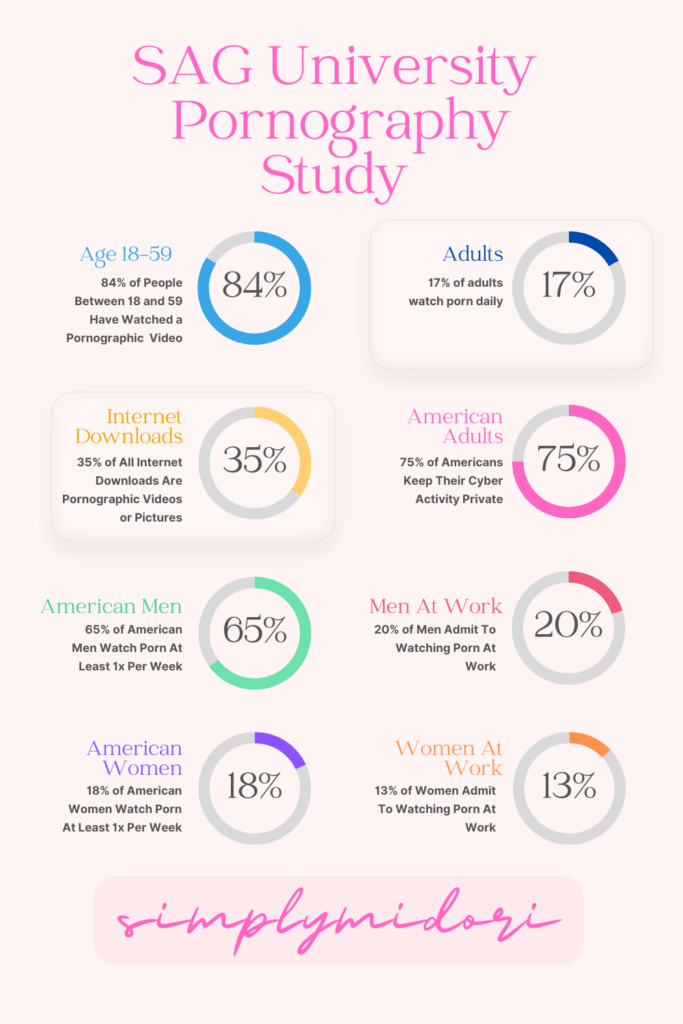As the internet continues to expand, so does its seedy underbelly. Pornography, in particular, has become a ubiquitous presence online, leaving parents and educators scrambling to shield children from its explicit content.
While the sheer amount of pornography online is a cause for concern, what’s even more alarming is how easily accessible it has become. No longer confined to the back rooms of adult bookstores, pornography can now be accessed with just a few clicks of a mouse – intentionally or not.
The ease of access to pornography is driving some startling facts about our current society. Take a look at what a recent sex research paper revealed:
While these numbers are staggering and quite shocking, what is more revealing is that each number steadily increases as the years go by.
The Truth About Porn Addiction
Once upon a time, people thought watching porn was just a harmless pastime. But as time passed, more and more individuals found themselves caught in a vicious cycle of porn consumption that they couldn’t break.
Now you may think that you are not addicted to porn.
But not so fast; first, let’s explore what porn addiction means? It’s when you cannot resist the urge to watch porn or look at pornographic images even when it’s causing problems in your relationships, work, or personal life. Chances are you might feel ashamed or guilty about your porn use, but try as you might; you just can’t seem to stop.
As the addiction takes hold, individuals typically start watching new and different types of pornographic pictures to get their “fix.” But the truth is, this only intensifies the addiction and makes it even harder to break free. Unfortunately, porn consumption comes with a cost.
Is Porn Addiction A Real Thing?
Is pornography addiction a valid concept? There’s currently a debate in both the media and academic circles regarding whether excessive pornography consumption constitutes an addiction.
The disagreement partly arises from differing definitions of “addiction.” However, Dr. Nora Volkow, who heads the National Institute on Drug Abuse (NIDA) in the United States, is convinced that porn addiction is legitimate. She has even suggested changing NIDA’s name to acknowledge various addictions, including pornography, gambling, and food.
Indeed, studies indicate that among all forms of online entertainment—such as gambling, gaming, browsing, and social networking—pornography exhibits the highest likelihood of being addictive.
Previously, doctors and scientists typically associated addiction with substances physically ingested into the body, such as cigarettes, alcohol, or drugs. However, as researchers delved into the workings of the brain, our understanding of addiction evolved significantly.
We’ve come to understand that the crucial factor is not necessarily what enters the body or how it’s introduced but rather the reactions it elicits in the brain. Substances like cigarettes, alcohol, and drugs introduce foreign chemicals into the body through various means: inhalation, injection, ingestion, or inhalation through smoking.
On the other hand, behavioral addictions such as pornography consumption and gambling don’t introduce any new chemicals or substances into the body that weren’t already present. However, these behaviors trigger remarkably similar processes in the brain to substance addictions, which is what makes them potentially addictive.
How Porn Affects The Brain Like A Drug
Initially, tobacco and pornography may not seem to have much in common. Tobacco products are usually hidden behind store counters due to their well-known health risks, while porn is widely available online. Tobacco use can become expensive, whereas accessing porn is often free online.
So, where’s the similarity? Inside the brain.
If you’re unfamiliar with neuroscience, here’s a quick overview of how the brain functions. Deep within the brain lies a region known as the “reward center,” which is present in humans and mammals. Its primary role is to release chemicals associated with pleasure when we engage in beneficial activities like eating delicious food, exercising vigorously, or experiencing affectionate gestures like kisses.
The euphoric sensation generated by this chemical release motivates us to repeat these behaviors. Thanks to the reward center, our brains are wired to encourage actions that enhance our well-being and increase our chances of survival. It’s an effective system under typical circumstances.
The issue arises because the brain can be deceived. When addictive substances are used, they send a false signal to the brain. Unable to distinguish between these drugs and genuine, healthy rewards, the brain activates its reward center nonetheless. This triggers the release of dopamine, a crucial chemical that initiates a craving for the fake reward.
As long as there’s an abundance of dopamine circulating in the brain, the cravings intensify, and the individual feels an overwhelming urge to seek out more of the drug. Essentially, addictive drugs hijack the brain, redirecting it in a direction it was never intended to go. Instead of promoting healthy behaviors, these drugs lead individuals toward harmful and potentially dangerous activities.
Want to guess what else does that? Porn.
Studies have revealed that both pornography consumption and addictive substances like tobacco have similar impacts on the brain, which differ significantly from the brain’s response to natural pleasures such as eating or engaging in sexual behaviors.
Think about it: when you eat a snack or enjoy a romantic moment, eventually, your cravings diminish, and you feel content. This occurs because the brain has a natural mechanism to regulate such pleasures. According to Nora Volkow, Director of the National Institute of Drug Abuse, dopamine cells cease their activity after repeated exposure to natural rewards like food or sex/
However, addictive drugs continue to elevate dopamine levels without providing the brain with a chance to rest. The more doses drug users consume, the more dopamine floods their brains, intensifying their cravings to continue using. This is why it’s incredibly challenging for drug addicts to halt their usage once they’ve taken the first dose. A single hit can quickly escalate into multiple hits or even an entire lost weekend.
What else can incessantly stimulate dopamine release in the brain? You guessed it: pornography.
Scientists have long understood that sexual arousal and performance can be heightened simply by introducing novelty, such as trying different sexual positions, using toys, or changing partners.
This phenomenon occurs because the brain responds to novel sexual experiences by releasing more dopamine, similar to the effect of drugs. Internet porn sites capitalize on this by providing a constant stream of new and stimulating erotic content, available 24/7 in vibrant colors and high speed. Users can easily seek out more intense and diverse material to continuously boost their dopamine levels with just a click, preventing boredom and maintaining arousal.
Similar to how a drug addict requires increasing amounts of the substance to achieve a high or simply feel normal, frequent porn users may find themselves needing more or seeking out more extreme content to regain the excitement they once felt. Moreover, quitting porn can even trigger withdrawal symptoms akin to those experienced with drugs.
However, there is also positive news. Even individuals with problematic pornography use habits can break free and regain control of their lives. Thousands have successfully overcome their addiction, and if you’re seeking resources for yourself or a loved one, click here to learn more.
How Pornography Effects Your Mental Health
Do you know porn consumption often goes hand in hand with other mental health disorders? Do you find yourself curious about the correlation and how this can happen?
Picture this: a young man spends hours upon hours glued to his computer, engrossed in scenes of explicit content. He knows it’s not healthy, but he can’t seem to stop. As time passes, he begins to notice that he’s feeling increasingly anxious in social situations. He’s become a recluse, preferring the company of his computer to that of real people on top of that scientists are starting to explore the question does watching porn cause memory loss.
It turns out that this young man’s addiction to pornography is only exacerbating his social anxiety. But he’s not alone.
Many individuals struggling with porn addiction also experience social anxiety. However, it does not stop there; here is a list of mental health disorders that can accompany porn addiction:
-
Depression: Feelings of hopelessness and despair can often lead to a reliance on porn as a form of escape.
-
Social anxiety: Porn addiction can cause individuals to withdraw from social situations, making it difficult to connect with others.
-
Mood disorders: Those with bipolar or other mood disorders may turn to porn to self-medicate.
-
Sex addiction: Pornography addiction can lead to a compulsive need for sexual gratification, manifesting in other forms of sexual behavior.
-
Substance use disorders: Research has found a link between porn addiction and substance abuse, particularly in men.
-
Memory problems: Studies have shown that excessive porn consumption can lead to memory problems and decreased cognitive function.
-
Smoking and tobacco use: While the link isn’t apparent, some research suggests that porn addiction may increase the likelihood of smoking or tobacco use.
-
Erectile dysfunction: Excessive porn consumption has been linked to erectile dysfunction in young men due to the overstimulation of the brain’s reward system.
Porn addiction is a complex issue with far-reaching consequences.
Many people with porn addictions are reluctant to seek help because of the shame and stigma associated with their addiction.
How porn can destroy romantic relationships
Pornography appears to be a modernized and more polished rendition of love, akin to Love 2.0. It offers an expedited, readily available, and affordable version of affection.
In pornographic content, locating a “partner” requires minimal effort. This individual is constantly eager, receptive, and yearning for the viewer’s attention. This fictional partner seemingly has no other obligations than to await the consumer, always enthusiastic and in a state of perpetual arousal.
They are young (or old), attractive, sexually adventurous, and eager to satisfy your wants. This partner will never experience boredom, annoyance, or have an off day, nor will they require emotional support or understanding.
In fact, their sole desire is to provide intense, ecstatic orgasms that appear authentic! Furthermore, if this pornographic partner fails to captivate the consumer, they can easily be replaced with the click of a computer mouse.
Many supporters of pornography argue that it’s just a harmless fantasy. However, the issue is far from harmless. Internet pornography possesses distinct characteristics, including endless novelty, instant accessibility, and the ability to escalate to more extreme content easily.
These factors can condition an individual’s sexual arousal to aspects of pornography consumption that don’t translate well to real-life relationships.
As a result, real-life sexual experiences may not live up to expectations, leading to decreased arousal. This could explain why counselors’ offices and divorce courts are seeing an increase in couples who find that pornography is damaging their romantic relationships.
More and more couples in therapy are saying that pornography is causing problems in their relationships. Studies indicate that watching pornography is connected to less stable relationships, higher chances of cheating, and an increased likelihood of divorce.
This applies to both men and women, but research has found that men who watch porn tend to find their partners less sexually attractive and feel less in love with them.
In a recent study that followed couples from 2006 to 2012, researchers wanted to understand what factors affected the quality of marriages and satisfaction with sex lives. They discovered that among all the factors they examined, porn use was the second strongest predictor of marital problems.
Furthermore, the marriages most negatively affected were those of individuals who heavily consumed porn, viewing it once a day or more. However, it’s not only married couples who are negatively impacted by porn.
Unmarried couples in romantic relationships who watch pornography together have double the rate of infidelity compared to couples where partners watch it separately and three times more than couples who don’t watch porn at all.
A recent study of romantically involved individuals, most of whom were not married, found that those who frequently used porn were most likely to have lower satisfaction and intimacy in their relationships.
Related Reading: How To Have A Relationship That’s Free From Porn
Why males and females that watch porn find it difficult to exist in a real relationship?
The research is clear: People who use porn often report feeling less love and trust in their relationships, are more likely to separate or divorce, and sometimes view marriage as a burden.
In general, they are less committed to their partners, less satisfied in their relationships, and more skeptical about love and relationships in general.
They also struggle with communication with their partners and are more likely to experience escalating arguments, including accusations, criticisms, name-calling, and bringing up past hurts. Additionally, porn negatively affects a couple’s sex life.
Is this like the chicken and egg situation? Does porn harm relationships, or do people use porn because their relationships are already troubled? It’s likely a bit of both.
When a couple faces difficulties, one partner might turn to porn for distraction or relief, which can hurt the other partner. The hurt partner may feel unattractive and insecure, as if they’re being compared to porn performers and fantasies. This emotional distance may lead the partner who uses porn to feel even more distant, so they cope with stress by turning to more porn, and the cycle continues.
Be Honest: Do You Struggle With A Pornography Addiction?
It’s not easy to admit when we have a problem, especially one as stigmatized as porn addiction. But if you’re reading this, you’ve already taken a brave step in acknowledging that something may be amiss. So, let’s dive into some questions that could help shed some light on your situation:
-
Do you spend more time watching porn than on other activities? If it’s taking over other important areas of your life, it might be time to reassess your habits.
-
Do you feel guilty or ashamed after watching porn? If your porn viewing is causing negative emotions, it’s a sign that something is not quite right.
-
Has porn affected your relationships or personal life? Perhaps you’ve found yourself distancing from friends and family or experiencing difficulty in romantic relationships due to your porn consumption.
-
Do you find yourself constantly thinking about porn, even when you’re not watching it? Obsessing over porn can be a major red flag. If it’s consuming your thoughts, it’s time to take a step back.
-
Have you ever tried to stop watching porn but found yourself unable to? Feeling like you have no control over your porn consumption can indicate addiction.
-
Do videos and images of porn often appear in your mind throughout the day? When porn starts to invade your thoughts, even when you’re not actively seeking it out, it’s a sign that it’s taking over your life.
-
Do you often feel like you need to “release” to get through the day? If porn has become a crutch for you to cope with stress or anxiety, it’s time to seek help.
If you answered “yes” to any of these questions, it’s worth exploring the possibility that you’re struggling with a porn addiction. Remember, addiction is not a moral failing; seeking help is a brave step toward healing and freedom, furthermore, know you’re not alone. It’s a battle that many people face, but it’s also a battle that can be won. While there’s no easy formula, there is hope. I’m living proof…
Related Reading: My Porn Addiction Story And How I Broke Free
Conclusion
There’s no denying that pornography has a profound impact on all of us. It will boost arousal and satisfaction as well as lead to addiction. From internet searches to pornographic images, it can really leave its mark on our lives in a negative way.
That being said, it’s essential to be conscious in your life-long journey to explore and learn about the effects of pornography; for not only those you care about but for yourself as well. Communicating with trusted friends, family, and professionals is the key to unlocking helpful insight.
Although it may seem difficult to navigate at first glance, once you take charge and make informed decisions about porn usage, you can understand the real risks.
This blog was intended for educational purposes only – so we encourage readers to use this information as a unique opportunity for personal growth and self-analysis.
We invite you to investigate this topic further if needed – if you find this blog helpful, we’d love for you to share it with your community!












